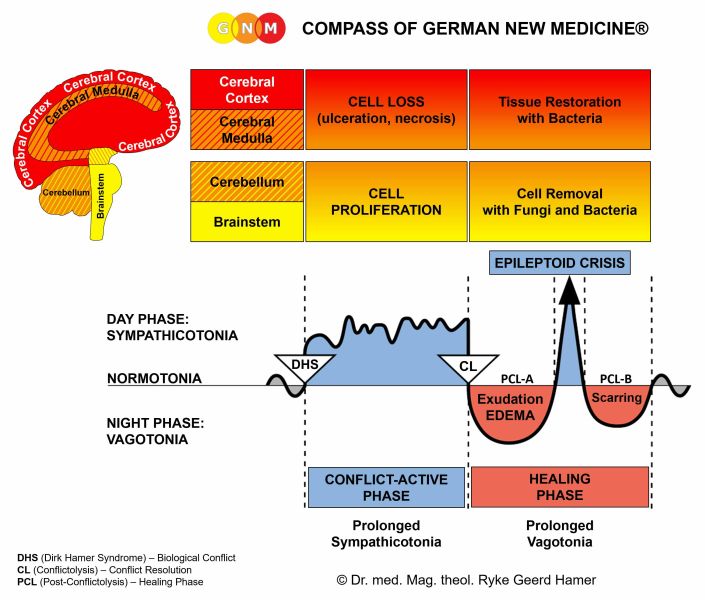Pregnancy is often considered a time of joy and anticipation. However, it can also be a period marked by numerous physical and emotional challenges. According to Dr. Ryke Geerd Hamer’s principles of Germanische Heilkunde (GHK), the health issues experienced during pregnancy are deeply intertwined with unresolved psychological conflicts. This article explores these common issues categorized by trimester, while also addressing how modern medical interventions, such as frequent ultrasounds and invasive procedures, contribute to underlying conflicts that may manifest as health problems.
First Trimester (0-12 Weeks)
During the first trimester, the body undergoes rapid changes as it prepares to nurture new life. According to GHK, the most common health issues during this stage include:
- Morning Sickness and Nausea:
Conflict: The biological conflict underlying nausea and vomiting can be related to the “stomach conflict” described by GHK, often triggered by a “territorial anger” or “disgust conflict.” This could be related to the mother’s distress over unwanted interference, such as frequent ultrasounds or pressure to undergo lab tests that provoke anxiety. - Fatigue and Exhaustion:
Conflict: Fatigue can be associated with a “self-devaluation” conflict, where the mother feels inadequate or overwhelmed by the new responsibilities. This conflict may be exacerbated by the stress of early testing procedures or the medicalization of pregnancy, which undermines her confidence. - Spotting or Light Bleeding:
Conflict: Light bleeding can be linked to a “nest-worry conflict,” where the mother’s security about her home or relationship is threatened. This could be compounded by the emotional strain of early invasive procedures, such as amniocentesis, which heighten fears about the baby’s health.
Second Trimester (13-26 Weeks)
The second trimester is often referred to as the “honeymoon phase” of pregnancy, yet conflicts can still arise, affecting both the mother and the developing fetus:
- Back Pain:
Conflict: According to GHK, back pain may be related to a “self-devaluation conflict” concerning the spine, particularly if the mother feels unsupported or burdened by external pressures, such as the frequency of medical appointments or stress from work. - Gestational Diabetes:
Conflict: Gestational diabetes could be linked to a “resistance conflict,” where the mother feels restricted or trapped. This conflict can be heightened by the rigid structure imposed by frequent lab tests and dietary restrictions that feel invasive. - Anxiety and Depression:
Conflict: Emotional distress in the second trimester may stem from a “loss conflict” or an unresolved fear of losing the baby. Modern practices, such as recurrent ultrasounds, can trigger this fear by continually drawing attention to potential problems rather than the natural process of pregnancy.
Third Trimester (27-40 Weeks)
As the pregnancy approaches full term, the focus shifts to delivery, but conflicts can still emerge, manifesting as common health issues:
- Preterm Labor:
Conflict: A “fear-fright conflict” or “abandonment conflict” may trigger preterm labor. This fear can be amplified by medical interventions, such as the suggestion of early induction or the constant monitoring of the baby’s development, which can undermine the mother’s trust in her body. - Swelling and Edema:
Conflict: Swelling can be connected to a “fluid conflict,” often tied to issues of overprotection or overwhelm. The medicalization of the pregnancy, through constant testing and the looming presence of medical procedures like cesarean sections, may contribute to this conflict. - Hypertension:
Conflict: High blood pressure may be linked to a “territorial conflict,” where the mother feels that her space or role is being threatened. The ongoing pressure from medical professionals to conform to a rigid birth plan can exacerbate this issue.
Impact of Modern Medical Practices on Pregnancy Conflicts
In the context of GHK, the rise in medical interventions during pregnancy is a significant source of conflict. Procedures such as frequent and often unnecessary ultrasonography, lab tests, and invasive procedures like amniocentesis introduce stressors that may not only cause physical discomfort but also activate deep-seated psychological conflicts.
- Ultrasonography: While ultrasounds are widely accepted as safe, frequent scans may trigger subconscious conflicts, especially if they convey negative or worrying information. The repeated exposure to potential risks can lead to an “existence conflict,” where the mother fears for the baby’s survival.
- Amniocentesis and Other Invasive Procedures: These procedures can provoke intense fear and anxiety. From a GHK perspective, the physical invasion of the womb could be interpreted by the psyche as a “territorial anger conflict,” particularly if the mother feels coerced or pressured into these decisions.
- Lab Tests: Routine blood tests and glucose screenings, while intended to monitor the mother’s health, can feel intrusive. The continuous surveillance can spark a “self-devaluation conflict” if the mother feels her body is being overly scrutinized or doubted.
Stages of Pregnancy According to GHK’s Compass
In GHK, conflicts correspond to specific biological programs that have evolved over time. Dr. Hamer’s compass categorizes these conflicts into distinct stages:

- Conflict Active Phase: During this phase, the conflict is unresolved, and symptoms such as morning sickness or anxiety may manifest. For example, the fear of miscarriage (a “loss conflict”) can be heightened by frequent ultrasounds that focus on detecting issues rather than supporting natural growth.
- Conflict Resolution Phase: If the conflict is resolved, such as through reassurance or a change in circumstances, the body begins the healing process. However, this phase can also present symptoms like fatigue or spotting, often misinterpreted as new problems rather than signs of recovery.
- Healing Crisis: The peak of the healing phase often involves intense symptoms, such as preterm labor or hypertension. This crisis can be a turning point, after which the body returns to equilibrium if the conflict remains resolved.
- Post-Healing Phase: In this final stage, the body stabilizes. However, if the conflict recurs, such as through ongoing medical interventions, the cycle may repeat, leading to chronic health issues.
Conclusion
Understanding pregnancy through the lens of GHK reveals how underlying conflicts, intensified by modern medical practices, can manifest as common health issues. By recognizing these conflicts and addressing them holistically, it is possible to support the natural process of pregnancy, minimizing unnecessary interventions, and fostering a healthier experience for both mother and child. Embracing a more harmonious and less invasive approach may lead to better outcomes, reinforcing the connection between mind, body, and the natural rhythms of life.

